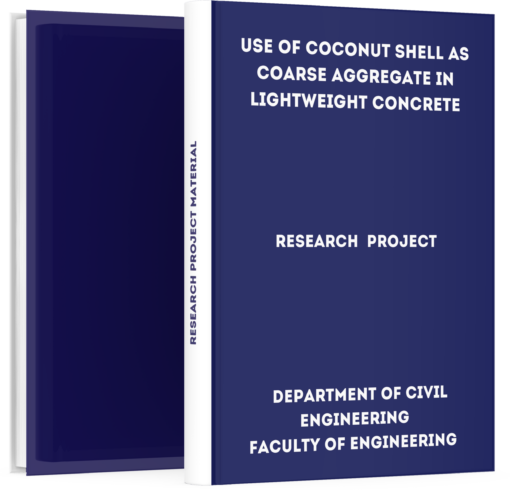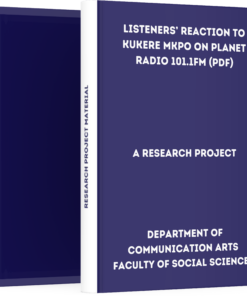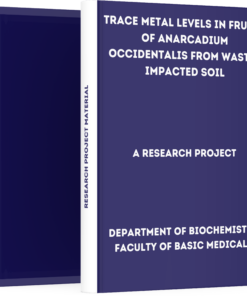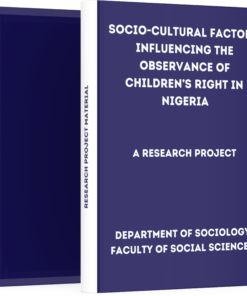Use of Coconut Shell as Coarse Aggregate in Lightweight Concrete
₦3,000.00
If you are interested in getting this project material “Use of Coconut Shell as Coarse Aggregate in Lightweight Concrete”, click on the DOWNLOAD BUTTON to make payment and the file will be delivered to your email immediately after confirmation.
Description
– Use of Coconut Shell as Coarse Aggregate in Lightweight Concrete –
Download Use of Coconut Shell as Coarse Aggregate in Lightweight Concrete. Students who are writing their projects can get this material to aid their research work.
Abstract
This research work reports the investigation carried out to determine the use of coconut shell as an aggregate in light weight concrete. Concrete samples were produced with different mix ratios, to determine the best and economic proportions that will give acceptable compressive strengths.
Coconut shell aggregate exhibits low impact, crushing, and abrasion values of 1.3%, 1.16% and 2.23% respectively compared with normal aggregate with 19.23%, 25.60% and 27.67% respectively.
Coconut shell, however, has high percentage of water absorption capacity, elongation index and flakiness index of 23.72%, 26.69% and 86.12% respectively compared with that of normal aggregate of 1.80%, 8.78% and 36.89% respectively.
Concrete specimen was produced with coconut shell as coarse aggregate, ordinary river sand as fine aggregate and ordinary Portland cement as binders.
Trial mixes which include (1:1:1, 1:1½:2, 1:2:2, 1:2½:3, 1:1½:3, 1:2:4, 1:2:3, 1:3:3, 1:3:4, 1:4:4) were done and it was observed that mix ratio 1:1:1 and 1:2:2 gave good consistency and workability with water cement ratio 0.5. The mix ratio 1:1:1; 1:2:2 gave compressive strength of 16N/mm2 and 7.71N/mm2 at 28day strength test respectively.
In addition, Partial replacement of normal coarse aggregate with coconut shell was also carried out using the following percentages of 0%, 25%, 50%, 75% and 100% for a mix ratio1:2:4 .
Introduction
1.1 Background of the Study
Global attention has been focused on environmental preservation due to alarming depletion of ozone layer as a result of pollution resulting from manufacturing processes.
It was reported by Mehta (2001) that “cement production, coarse aggregate mining, processing and transportation operations accounts for about 7% of the global loading of carbon dioxide into the atmosphere due to considerable amount of energy consumed, thereby affecting the ecology of the forested areas and river beds.
In an attempt to reduce environmental degradation, close attention is now being paid to material recycling and the use of agricultural and industrial wastes in concrete production.
In civil engineering practice and construction works, large volumes of coarse aggregates are usually used in the production of concrete. Gambhir (2005) reported that coarse aggregate constitutes about 75% to 85% of the concrete matrix.
Concrete being one of the major building materials that is used virtually in all aspects of construction and could be delivered to the job site, and be molded in situ or pre-cast to any form or shape, makes it a material of choice in construction.
Hence the significance and relevance of coarse aggregate in concrete production in all areas of civil engineering practice and building construction cannot be ignored.
The basic constituents of concrete are cement, fine aggregate (sand), coarse aggregate (granite chipping) and water. Nigeria being a developing country is faced with inadequate provision of physical infrastructure; shelter and related amenities,
which are typical factors of under development that need to be addressed through provision of alternative, cheap and affordable materials. In these areas’ development require the use of cement and other related materials such as coarse aggregate.
How to Download this Project Material
First, note that we are one of the best and most reliable online platforms because we don’t retain any of your personal information or data as regards making payments online.
PRICE: ₦3,500 ₦3,000 (Three Thousand Naira Only)
Make a bank deposit or mobile transfer of ₦2,000 only to the account given below;
Bank Name: UBA Account Number: 1022564031 Account Name: TMLT PRO SERVICES
After making the payment, CLICK HERE to send the following on WhatsApp;
- Depositor’s Name or Screenshot of Payment
- Name of the Past Question
- Active Email Address
or Call Us On +2348082284439 Once your details have been received and your payment confirmed by us, you will receive the past question in your email or WhatsApp within 5 Minutes.
Guarantee of Getting the Material
We understand that due to the high rate of fraud, many people are afraid of making purchases online but be rest assured that PastExamQuestions will deliver your material after payment.
Once your details have been received and your payment confirmed by us, you will receive the past question in your email or WhatsApp.
Give us Feedback
Have we been able to satisfy you? How well do you think the material will be helpful after having gone through it? Does the price worth the material?
Let’s hear from you! We recommend that our customers give feedback at the end of every transaction to enable us to serve better. You can do this by clicking the review button on this page.
Where is the review button? >> Just scroll up to where you see reviews





Reviews
There are no reviews yet.